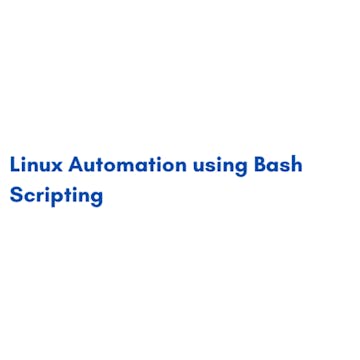
Good to know
Save this course
Reviews summary
Bash scripting
Activities
Mentorship
Show steps
Seek guidance and support from experienced mentors.
Browse courses on
Bash Scripting
Show steps
-
Identify potential mentors
-
Reach out to these mentors and introduce yourself
-
Request their guidance and support
Interactive exercises
Show steps
Complete interactive exercises to reinforce understanding of bash scripts and linux commands.
Browse courses on
Bash Scripting
Show steps
-
Go through the provided exercises
-
Attempt to solve the exercises on your own
-
Check your answers against the provided solutions
Study groups
Show steps
Collaborate with peers to discuss concepts, share knowledge, and work on projects.
Browse courses on
Bash Scripting
Show steps
-
Form a study group with other students
-
Meet regularly to discuss course material
-
Work together on assignments and projects
Three other activities
Expand to see all activities and additional details
Show all six activities
Mentoring
Show steps
Share your knowledge and skills by mentoring other students.
Browse courses on
Bash Scripting
Show steps
-
Identify students who need help with bash scripting
-
Provide guidance and support to these students
-
Share your knowledge and expertise
Bash Script Examples
Show steps
Create bash scripts to demonstrate your understanding of the concepts covered in the course.
Show steps
-
Identify a task or problem that can be automated using a bash script
-
Design and write a bash script to solve the task or problem
-
Test and refine your bash script
Real-world projects
Show steps
Apply your bash scripting skills to solve real-world problems and automate tasks.
Browse courses on
Bash Scripting
Show steps
-
Define the problem or task that you want to solve or automate
-
Design and develop a bash script to address the problem or task
-
Test and refine your bash script
-
Document your bash script and share it with others
Mentorship
Show steps
Seek guidance and support from experienced mentors.
Browse courses on
Bash Scripting
Show steps
- Identify potential mentors
- Reach out to these mentors and introduce yourself
- Request their guidance and support
Interactive exercises
Show steps
Complete interactive exercises to reinforce understanding of bash scripts and linux commands.
Browse courses on
Bash Scripting
Show steps
- Go through the provided exercises
- Attempt to solve the exercises on your own
- Check your answers against the provided solutions
Study groups
Show steps
Collaborate with peers to discuss concepts, share knowledge, and work on projects.
Browse courses on
Bash Scripting
Show steps
- Form a study group with other students
- Meet regularly to discuss course material
- Work together on assignments and projects
Mentoring
Show steps
Share your knowledge and skills by mentoring other students.
Browse courses on
Bash Scripting
Show steps
- Identify students who need help with bash scripting
- Provide guidance and support to these students
- Share your knowledge and expertise
Bash Script Examples
Show steps
Create bash scripts to demonstrate your understanding of the concepts covered in the course.
Show steps
- Identify a task or problem that can be automated using a bash script
- Design and write a bash script to solve the task or problem
- Test and refine your bash script
Real-world projects
Show steps
Apply your bash scripting skills to solve real-world problems and automate tasks.
Browse courses on
Bash Scripting
Show steps
- Define the problem or task that you want to solve or automate
- Design and develop a bash script to address the problem or task
- Test and refine your bash script
- Document your bash script and share it with others
Career center
Security Analyst
Systems Administrator
IT Auditor
Database Administrator
Network Administrator
Machine Learning Engineer
IT Consultant
Cloud Engineer
IT Manager
Data Analyst
Data Scientist
DevOps Engineer
Technical Writer
Software Developer
Web Developer
Reading list
Share
Similar courses
OpenCourser helps millions of learners each year. People visit us to learn workspace skills, ace their exams, and nurture their curiosity.
Our extensive catalog contains over 50,000 courses and twice as many books. Browse by search, by topic, or even by career interests. We'll match you to the right resources quickly.
Find this site helpful? Tell a friend about us.
We're supported by our community of learners. When you purchase or subscribe to courses and programs or purchase books, we may earn a commission from our partners.
Your purchases help us maintain our catalog and keep our servers humming without ads.
Thank you for supporting OpenCourser.



